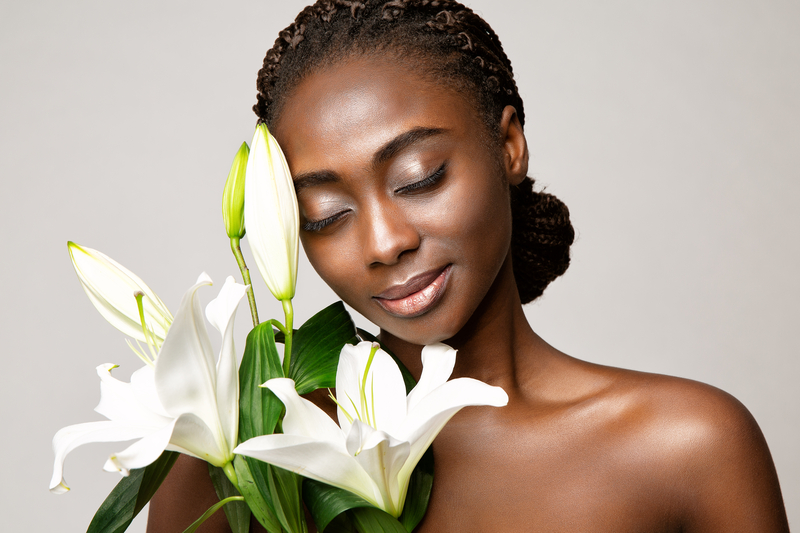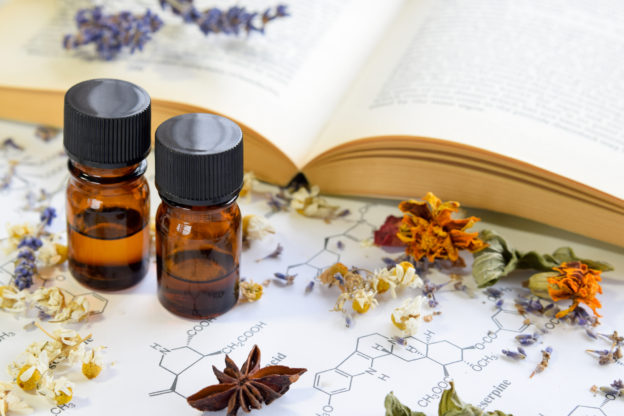Essential oils. Just the name suggests exotic fragrances and potential health benefits. Let’s define what we’re talking about. Essential oils are the easily evaporated, low-boiling point liquids present in plants. When you put your nose to a rose and sniff, these molecules evaporate from the rose and are sucked into your nose, to be recognized as the beautiful scent of roses. There is no truer plant fragrance than essential oils; it’s the same material you smell when the plant is growing wild.
Unfortunately, some marketers of essential oils have widely overstated their usefulness for reasons beyond scent. If you look hard enough, it seems you’ll find a cure for most illnesses being promised using essential oils. It’s an “Appeal to Nature” – if something is natural, it must be good for you, right? Hemlock is natural. Snake venom is natural. So, let’s take a detached viewpoint: what are the pros and cons of using essential oils in cosmetics?

Their greatest (and most often, sole) benefit is their aromatic appeal. Essential oils smell absolutely fantastic. By blending several together, you can easily establish a unique combined fragrance oil for your brand. Scent is powerfully linked to memory, and if you can convince your customers to associate the aroma of your products with a positive experience, you’ve won a significant marketing achievement. I use Pine-Sol, with pine oil, as a household cleaner. It’s probably not the best cleaner in the world, but I’ve grown to associate pine aroma with cleanliness. I’ve fallen for marketing, and now I’m a customer for life.

Occasionally, we find that essential oils can have other positive effects beyond scent. Peppermint oil contains menthol, which can provide a cooling sensation. It’s also useful for some people as an anti-nausea measure; just the smell of peppermint alone can sometimes avert a bout of sickness. Rosemary oil has shown some promise for hair regrowth. Orange oil is used as a powerful cleaning solvent. Thyme oil can help to deodorize. However, most health claims for essential oils are completely misleading. In any case, advertising medical benefits for a non-medicated cosmetic is against cosmetic regulations.
We must compare these advantages to the disadvantages of using essential oils in cosmetics. To start with, they’re more expensive than other fragrance oils. It takes roughly 5 grams of lavender flowers to make a single, solitary drop of lavender essential oil. It takes roughly 250 grams – more than half a pound – of rose petals to make a single drop of rose essential oil. Beyond price considerations, there are potential sustainability issues.
Looking beyond the cost of the fragrance, we must also consider negative health effects that essential oils may bring. The MoCRA legislation in the US takes a stern stance on product safety. That’s unfortunate for essential oils because most of them contain irritants. It’s usually these very irritating molecules that are responsible for the scent, so we can’t purify them away / dispose of them; if we want that scent then we must accept the presence of irritants. If your customers have sensitive skin, using an essential oil could very possibly result in a skin reaction.
Beyond immediate irritation, some components of essential oils are sensitizers, especially after exposure of the skin to light. Your customers may use the product for months with no issues, only to find that suddenly one day your product raises a rash. Their skin has become sensitized to the presence of allergens, and now even casual contact can be an irritation concern. The customer may honestly believe that your company has “changed the formula” and “they’re no good anymore”, as they don’t have the insight that you do.
If you’d still like to consider the use of essential oils, I recommend avoiding verbena, cumin, cinnamon, oregano, clove, tea tree, and citrus peel oils. That’s not a complete list, but those have more irritation concerns than some of the others.
I’m not asking you to dismiss the use of essential oils. I use them in just about every product I formulate. You must be informed of the dangers, and you have to show restraint. We want to help people to have a great experience and to feel better about themselves / their appearance, but safety is – and always will be – the priority. The goal is to design products that deliver a great sensory experience but also respect the skin to which they’re being applied.
Happy formulating!

